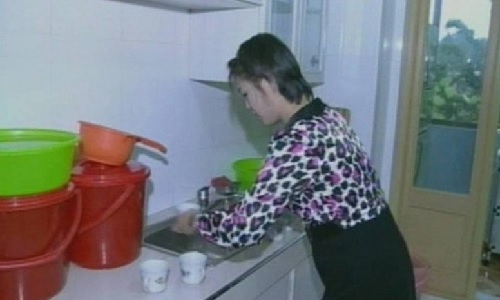As North Korea’s real estate market booms, the presence of a sink is becoming an important amenity for houses on sale. Women are playing increasingly important roles as breadwinners via their market activities, which has in turn give them more influence in deciding household affairs.
A source in South Pyongan Province told Daily NK on November 24 that the kitchen layout has become an important factor in determining house prices. Women are particularly interested in the quality of the sink, and housing prices are beginning to reflect whether the sink is a so-called ‘8.3 market product’ or an imported foreign product.
An 8.3 market product refers to a product made of scrap materials, including the by-products of state enterprises. They can be produced by domestic working groups and small teams and are not a part of the state’s production plan. Residents refer to these products as ‘fake’ or ‘products of poor quality.’
According to the source, officials and donjuLiterally "masters of money," donju refers to people who hav... More (new affluent middle class) in the big cities like Pyongyang have long since upgraded from such products, and installed foreign-manufactured sinks in their homes.
Ordinary citizens in the provincial areas are now also looking at the kitchen first when buying a house. “Residents carefully check the quality of the sink and where it was made when assessing a new house,” she said.
“For decades, ordinary people have been washing their dishes using water in a wooden bucket in the kitchen, but this is becoming a thing of the past. As foreign kitchens have become popular, even poorer people are spending their savings on renovating their kitchen first.”
A source in North Pyongan Province added, “Officials and donjuLiterally "masters of money," donju refers to people who hav... More are buying expensive South Korean-made sinks while ordinary people are buying gold-plated Chinese-made products. Currently, sinks are sold for 10-20 USD at the general market, with the most expensive ones costing about 100 USD. Luxurious apartments sometimes have sinks that cost more than 1000 USD.”
The North Korean authorities have traditionally been in charge of housing design, construction planning, and allocation, including the internal features. However, as the private real estate market has been tacitly permitted since the early 2000s, foreign products and appliances have made their way into the interiors.
“Real estate agents are emphasizing the quality of the kitchen sink rather than the room layout. As most of their customers are women who earn money in the market, these agents are having an easier time selling houses with sophisticated kitchens in them,” the North Pyongan-based source noted.



















